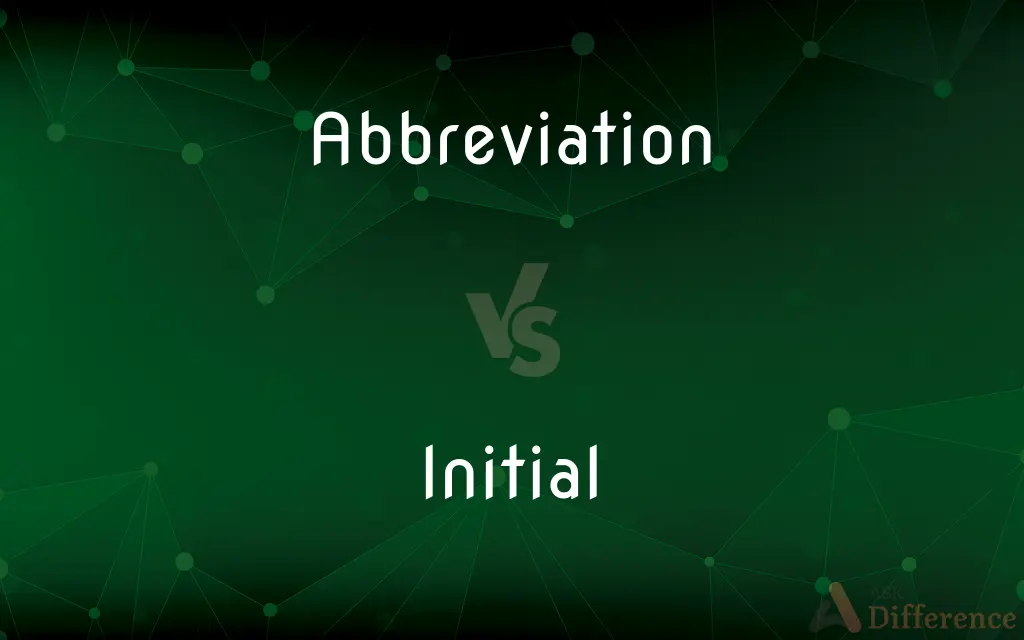Abbreviation vs. Initial — What's the Difference?
Edited by Tayyaba Rehman — By Fiza Rafique — Updated on March 20, 2024
An abbreviation is a shortened form of a word or phrase, while an initial is the first letter of a word, often used to represent names or terms.

Difference Between Abbreviation and Initial
Table of Contents
ADVERTISEMENT
Key Differences
Abbreviations are used to simplify written and spoken language, encompassing a wide range of forms including acronyms, initialisms, and contractions. These shortened forms can represent long phrases, organizations, or common words to save space and time. On the other hand, initials specifically refer to the first letters of each word in a sequence, primarily used in personal names, organizations, or sometimes in technical language.
While abbreviations can consist of various combinations of letters and sometimes include numbers (e.g., "Dr." for Doctor, "e.g." for exempli gratia), initials are strictly the first letters of words and are often used in uppercase (e.g., "J.K. Rowling", "NASA"). This distinction highlights the broader applicability of abbreviations beyond just representing first letters.
Abbreviations are employed in both formal and informal contexts to convey information more efficiently. They can be particularly useful in professional and academic writing where certain terms are repeated frequently. In contrast, initials are often used to personalize or anonymize individuals' names, or to simplify long or complex names of entities in a way that is easily recognizable and remembered.
The use of abbreviations requires understanding of the context and familiarity with the term being abbreviated, as they can sometimes lead to confusion if not commonly recognized. Initials, while simpler, also rely on context for their interpretation, especially in cases where multiple entities share the same initials.
In some instances, abbreviations and initials can intersect, particularly in the case of initialisms (where each letter in the abbreviation stands for a word and is pronounced individually, such as "FBI" for Federal Bureau of Investigation). This shows how initials can form a subset of abbreviations, serving specific purposes within the broader category of linguistic shorthand.
ADVERTISEMENT
Comparison Chart
Definition
A shortened form of a word or phrase.
The first letter of a word.
Types
Acronyms, initialisms, contractions.
First letters of names or terms.
Use Cases
Simplifying language, saving space, professional writing.
Representing names, simplifying entity names.
Examples
Dr., e.g., ASAP, UNESCO.
J.K. Rowling, NASA, J.F.K.
Pronunciation
Depends on type (as a word or by letter).
Typically pronounced as individual letters.
Contextual Dependence
High (understanding based on common usage).
Moderate (usually clear in context, but may require knowledge of the entity).
Form
Can include multiple letters and sometimes numbers.
Consists of single letters, usually uppercase.
Intersection
Initialisms are a type of abbreviation.
Can be part of abbreviations, specifically initialisms.
Compare with Definitions
Abbreviation
The process of shortening words or phrases in writing.
Ave. is the abbreviation for Avenue.
Initial
A character indicating the beginning of a document or section.
The large decorated initial in medieval manuscripts.
Abbreviation
A condensed form commonly used in technical and scientific communication.
DNA for Deoxyribonucleic Acid.
Initial
Initials used as a form of signature or identification.
Please initial here to confirm receipt.
Abbreviation
An informal or slang shortening of words in common speech.
Info for information.
Initial
A letter representing the first letter of each word in a phrase or name of an organization.
IBM for International Business Machines.
Abbreviation
A shortened form of a word or phrase used to save space or avoid repetition.
Etc. stands for et cetera.
Initial
The first letter of a personal name, used especially in written communication.
M. Jordan for Michael Jordan.
Abbreviation
Representations of organizations or concepts through their initial letters or parts of words.
NATO for North Atlantic Treaty Organization.
Initial
The use of letters to represent distinct parts of complex terms in science or technology.
UV for Ultraviolet.
Abbreviation
An abbreviation (from Latin brevis, meaning short) is a shortened form of a word or phrase, by any method. It may consist of a group of letters or words taken from the full version of the word or phrase; for example, the word abbreviation can itself be represented by the abbreviation abbr., abbrv., or abbrev.; NPO, for nil (or nothing) per (by) os (mouth) is an abbreviated medical instruction.
Initial
In a written or published work, an initial or drop cap is a letter at the beginning of a word, a chapter, or a paragraph that is larger than the rest of the text. The word is derived from the Latin initialis, which means standing at the beginning.
Abbreviation
The act or product of shortening.
Initial
Of, relating to, or occurring at the beginning; first
Took the initial step toward peace.
Abbreviation
A shortened form of a word or phrase used chiefly in writing to represent the complete form, such as Mass. for Massachusetts or USMC for United States Marine Corps.
Initial
Designating the first letter or letters of a word.
Abbreviation
The result of shortening or reducing; abridgment.
Initial
The first letter of a proper name.
Abbreviation
(linguistics) A shortened or contracted form of a word or phrase, used to represent the whole, utilizing omission of letters, and sometimes substitution of letters, or duplication of initial letters to signify plurality, including signs such as +, =, @.
Hants is an abbreviation of Hampshire.
Initial
Initials The first letter of each word of a person's full name considered as a unit
Stationery monogrammed with her initials.
Abbreviation
The process of abbreviating.
Initial
The first letter of a word.
Abbreviation
(music) A notation used in music score to denote a direction, as pp or mf.
Initial
A large, often highly decorated letter set at the beginning of a chapter, verse, or paragraph.
Abbreviation
(music) One or more dashes through the stem of a note, dividing it respectively into quavers, semiquavers, demisemiquavers, or hemidemisemiquavers.
Initial
To mark or sign with initials, especially for purposes of authorization or approval.
Abbreviation
Any convenient short form used as a substitution for an understood or inferred whole.
Initial
Chronologically first, early; of or pertaining to the beginning, cause or origin.
Our initial admiration for their efficiency gave way to disgust about their methods.
The initial stages of a syndrome may differ vastly from the final symptoms.
Abbreviation
(biology) Loss during evolution of the final stages of the ancestral ontogenetic pattern.
Initial
Spatially first, placed at the beginning, in the first position; especially said of the first letter of a word.
The initial letter of names is usually printed with a capital letter.
Abbreviation
(mathematics) Reduction to lower terms, as a fraction.
Initial
The first letter of a word or a name.
Abbreviation
The act of shortening, or reducing.
Initial
In plural, the first letter of each word of a person's full name considered as a unit.
You can get your initials printed at the top.
Abbreviation
The result of abbreviating; an abridgment.
Initial
A distinguished initial letter of a chapter or section of a document.
Abbreviation
The form to which a word or phrase is reduced by contraction and omission; a letter or letters, standing for a word or phrase of which they are a part; as, Gen. for Genesis; U.S.A. for United States of America.
Initial
(phonology) onset, part of a syllable that precedes the syllable nucleus in phonetics and phonology.
Abbreviation
One dash, or more, through the stem of a note, dividing it respectively into quavers, semiquavers, or demi-semiquavers.
Initial
(transitive) To sign one's initial(s), as an abbreviated signature.
Please initial each page and sign the contract in full at the bottom.
Abbreviation
A shortened form of a word or phrase
Initial
Of or pertaining to the beginning; marking the commencement; incipient; commencing; as, the initial symptoms of a disease.
Abbreviation
Shortening something by omitting parts of it
Initial
Placed at the beginning; standing at the head, as of a list or series; as, the initial letters of a name.
Initial
The first letter of a word or a name.
Initial
To put an initial to; to mark with an initial of initials.
Initial
The first letter of a word (especially a person's name);
He refused to put the initials FRS after his name
Initial
Mark with one's initials
Initial
Occurring at the beginning;
Took the initial step toward reconciliation
Common Curiosities
Can initials stand for something other than names?
Yes, initials can represent the names of organizations, concepts, or even phrases in technical language.
Are all abbreviations made up of initials?
Not all abbreviations are made of initials; some are shortened forms of words without necessarily using the initial letters.
How are initials commonly used in personal names?
Initials are often used to represent the first names or middle names, alongside the full last name, particularly in formal contexts.
How do I know which abbreviations or initials are appropriate to use?
Use abbreviations and initials that are widely recognized and ensure your audience will understand them.
Why are some abbreviations pronounced as words and others letter by letter?
This depends on their form; acronyms are pronounced as words, while initialisms are pronounced letter by letter.
How are abbreviations and initials reflected in different languages?
Practices vary, but the principle of shortening for convenience is universal, though the forms and conventions differ.
What is the main purpose of using abbreviations?
To simplify communication by shortening long words or phrases, making writing and speaking more efficient.
Can the use of initials be considered a type of abbreviation?
Yes, initials can be considered a subset of abbreviations, specifically when they form initialisms.
What are the potential downsides of using too many abbreviations or initials?
Overuse can lead to confusion, especially if the audience is not familiar with the terms, reducing clarity and understanding.
Is there a rule for when to use an abbreviation vs. an initial?
The choice depends on convention, context, and clarity; abbreviations are more general, while initials specifically represent first letters.
Are abbreviations always shorter than the original phrase?
Yes, by definition, abbreviations are shorter forms of the original words or phrases.
Can using initials in a document make it less formal?
Not necessarily; the use of initials can be formal, especially in contexts where brevity and clarity are valued.
Are there any industries or fields where abbreviations or initials are particularly common?
Yes, fields such as science, technology, medicine, and business frequently use abbreviations and initials for efficiency and clarity.
How can I learn the meanings of specific abbreviations or initials?
Through context, dictionaries, or specific glossaries related to the field in question.
Is it acceptable to create new abbreviations or initials?
Yes, if there is a clear need and the new forms are explained to the audience, creating new abbreviations or initials can be appropriate.
Share Your Discovery

Previous Comparison
Salability vs. Saleability
Next Comparison
Shopping vs. MarketingAuthor Spotlight
Written by
Fiza RafiqueFiza Rafique is a skilled content writer at AskDifference.com, where she meticulously refines and enhances written pieces. Drawing from her vast editorial expertise, Fiza ensures clarity, accuracy, and precision in every article. Passionate about language, she continually seeks to elevate the quality of content for readers worldwide.
Edited by
Tayyaba RehmanTayyaba Rehman is a distinguished writer, currently serving as a primary contributor to askdifference.com. As a researcher in semantics and etymology, Tayyaba's passion for the complexity of languages and their distinctions has found a perfect home on the platform. Tayyaba delves into the intricacies of language, distinguishing between commonly confused words and phrases, thereby providing clarity for readers worldwide.















































